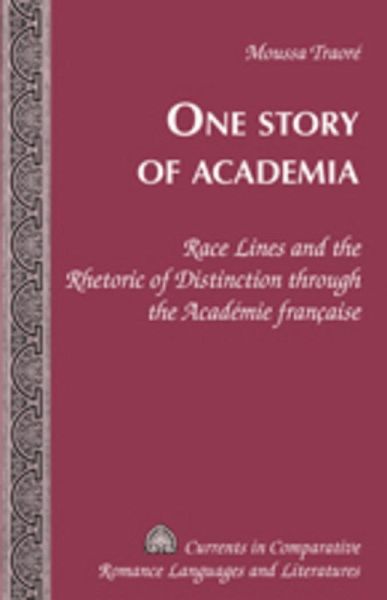
One Story of Academia
Race Lines and the Rhetoric of Distinction through the Académie française

PAYBACK Punkte
0 °P sammeln!
One Story of Academia: Race Lines and the Rhetoric of Distinction through the Académie française explores how the word race was historically linked to kings and feudal lords as a sign of elite social distinction, and how the Académie française has embodied that type of distinction in France since its establishment in 1635. Meant to be an undeclared, scholarly, «mysterious» companion to the French monarchy, the Académie created a powerful attraction for the highest classes, inspiring critics of different stripes; considered to be the highest expression of Frenchness, it excluded differen...
One Story of Academia: Race Lines and the Rhetoric of Distinction through the Académie française explores how the word race was historically linked to kings and feudal lords as a sign of elite social distinction, and how the Académie française has embodied that type of distinction in France since its establishment in 1635. Meant to be an undeclared, scholarly, «mysterious» companion to the French monarchy, the Académie created a powerful attraction for the highest classes, inspiring critics of different stripes; considered to be the highest expression of Frenchness, it excluded different groups based on class, gender, race/ethnicity, religion, ideology, and nationality. The self-proclaimed heir to ancient Greek and Roman scholarship, the Académie also claims to represent Europe, the West, and even Humanity. However, as an academic institution, it has experienced «dialectical» arguments between traditional (feudal) elitism, and scholarly elitism as both sought to define French culture in the seventeenth and eighteenth centuries. «Trustees of taste» and promoters of purity, the Académiciens and their strong supporters followed the troubled evolution of the word race and of social distinction. Borrowing from inter-European ethnic issues and nationalism, subscribers to the growing «racial» distinction had the features of the colonized analyzed with the French, and by extension, European and Western sense of social distinction in mind. Consequently the colonized ended up at the lowest end of the social scale; in turn, this placement explained the application of European feudal norms of exploitation on the colonies and created the more controversial and dreaded concept of «racism». This book highlights how the significance of language in the French sense of race - as superiority - is at the heart of the Académie française.













